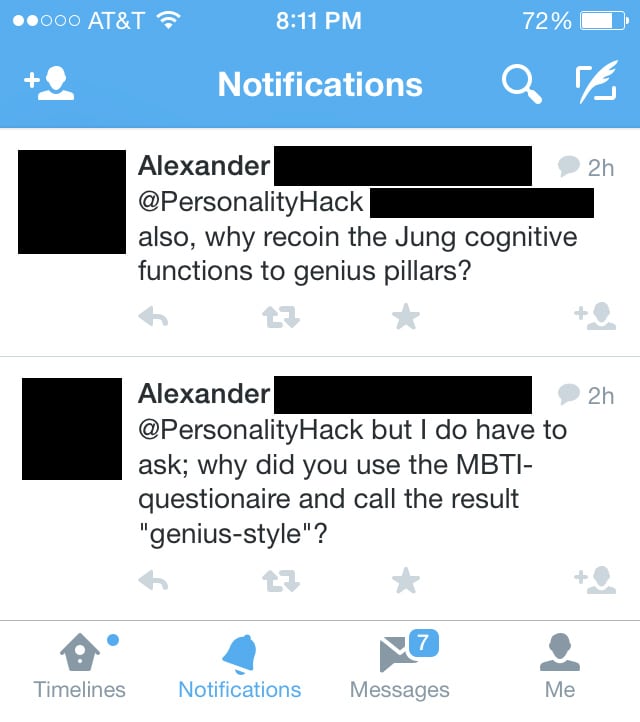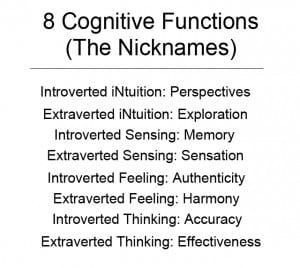 A word of warning: This post is primarily for Myers-Briggs and personality psychology geeks (of which I count myself one). If you’re new to personality types, this may or may not be interesting to you. Feel full permission to abort mission at any point.
A word of warning: This post is primarily for Myers-Briggs and personality psychology geeks (of which I count myself one). If you’re new to personality types, this may or may not be interesting to you. Feel full permission to abort mission at any point.
When I first started learning about personality types and, in particular, Myers-Briggs approximately 20 years ago (+/- a couple of years), the most accessible work on the subject was a book called “Please Understand Me” by the late David Keirsey.
It was pretty revolutionary for me, and started me on a path of obsession that I haven’t quite been able to shake two decades later. Very quickly I realized that the information was powerful, but it was also relatively limited. It was GREAT for understanding the 16 Myers-Briggs personality types, and I mastered those types as best I could.
I entered a space I see a LOT of people enter: I became an ‘expert’ at knowing people’s type descriptions and fancied myself an expert at being able to label others. It was a warm, self-satisfied place which gave me a sense of mastery and may or may not have prevented me from creating true intimacy with others. I vetted them based on the boxes I put them in, all the while thinking how awesome I was.
(Not everyone who learns personality types does this. My own personality type has a tendency to run to arrogance in any cognitive mastery, and I’ve had no choice but to let life beat the condescending asshole out of me. I’m a little spongy and bruised, but a much better person for it.)
At a certain point I started to abandon Myers-Briggs, realizing that my relationship with it wasn’t entirely healthy and I might be better off not typing other people, but just accepting them as they present.
Then I ran into another Myers-Briggs enthusiast and learned cognitive functions, and the world of typology burst open for me again. I became obsessed again, learned everything I could, did my own “think tanking” around the subject and once again gained a certain level of true mastery. But this time I wasn’t as arrogant overall, and I didn’t use it as a weapon to yield or a shield to hide behind.
I read everything I could, and of course – like you probably have – I started joining Myers-Briggs communities where everyone was using shorthand to reference cognitive functions and I felt ‘at home’.
Except, I wasn’t at home. In fact, in the course of a year I realized I HATED online forums around Myers-Briggs. Now, admittedly, as an ENTP I was on a lot of NT sites, which happen to be filled with the kind of arrogance that make a bad name for all NTs. The NF forums were a much softer place, often filled with bunnies and rainbows, and the occasional bouts of forum drama. But in comparison to the NT forum-style drama, still much closer to bunnies than, say, Howitzers.
ANYWAY.
To back up a little, there was a major barrier of entry when I graduated from standard, simple MBTI dichotomies (I/E, S/N, T/F, J/P) and into the cognitive functions. It didn’t take a super long time to realize that Introverts who are iNtuitive aren’t necessarily using Introverted Intuition, but it was still a bit of a challenge.
Now, I LOVE personality psychology, so the small barrier of entry wasn’t going to hold me back. But that’s not something I see playing out for everyone. In fact, that barrier of entry can trip people up pretty hardcore. I know people who have read “Gifts Differing” by Isabel Briggs-Myers and STILL don’t understand that she was talking about cognitive functions. As in, totally missed it.
While on the forums (that I came to hate), it became really obvious to me that crossing that barrier of entry was a sort of exclusive little club. As in, they didn’t want the masses to understand cog funcs, because otherwise they wouldn’t be able to stay exclusive in their knowledge. A knowledge, I suspect, that is weaponized more than it’s used as a tool for building up or a gift to give to the world.
So, when my previous business partner and I were talking about bringing this information to the masses we decided to just abandon that barrier of entry of confusion.
Why have someone say “Introvert Intuitives – they use Introverted Intuition, right?” and then have to respond with, “No, no, only if they’re Judgers, then they use Introverted Intuition. Otherwise they use Extraverted Intuition,” only to have them scratching their heads saying, “Huh?”
Why not just name them something else?
 Hence, the 8 nicknames were born.
Hence, the 8 nicknames were born.
No more confusion, no more head scratching, no more barrier of entry. No more conversations around “That doesn’t make sense, I should be using Introverted Intuition, I’m an INFP!” You’re an INFP, you use Exploration. And the response is, “Oh, okay. Cool.”
Thus, accessibility is born.
Second, why do we call it the Genius System?
As a Myers-Briggs enthusiast, I’m not sure if you’ve noticed, but a lot of people think they “know” Myers-Briggs.
“Oh, yeah, I had to take that personality test for my work one time. I’m an EPTF.”
If you say, “Yeah, that’s not how it works,” they already think they ‘know’ and their input mechanisms close down.
Just to be clear, I think personality psychology is one of the things that will save the world. Seriously. SAVE. THE. WORLD. There are a lot of people who are born leaders, born problem-solvers, born change agents who cloister themselves off from the world and lick the wounds called, “I’m not okay, I’m not good enough, nobody understands me.”
I think this is unconscionable, and it’s my mission to do everything possible to light these people up. To reverse the damage of “I’m not okay,” and reprogram the message, “I’m AMAZING and the world needs me.”
World hunger, war, pollution… all the biggies could be the focus of our attention if we weren’t focused on our personal wounds. If we’re happy, healthy, and coming from a place of psychological and emotional abundance, we can give back in a big way. And I personally believe understanding one’s personality type is a quick, leveraged first step in going, “Someone understands me? I’m actually part of a group of people like me? This isn’t ‘bad’, ‘wrong’ or ‘broken’, it’s just wiring?” And then BAM. The salve is on the wound, and the first steps toward solving major problems is taken. bitqt
If we can get people to re-evaluate their assumptions about a system that is becoming too easy to dismiss, if we can remove the barrier of entry to understanding something that could be a Game Changer for themselves and, potentially, the world, then we’ll call it Dr. Scholl’s Miracle Hair Ointment and Personality Salve.
Instead, of course, our marketing experience tells us to call it Genius Styles. Sometimes we call the cognitive functions ‘pillars’, sometimes ‘lenses’. It kind of depends upon the audience and what makes sense at the time. People like it, it makes them feel cool and special (our goal) and bonus: it’s true. Your primary and secondary cognitive functions ARE your genius, if you choose to development them, and so we have no problem stating them as such.
SO.
For you Myers-Briggs geeks (like me) that see something that feels amiss – you’re right. It IS amiss. But not to hornswaggle. To educate, to elucidate and, hopefully, to increase happiness for everyone who comes across the information.
Thanks for the question, Alexander! It was a GOOD one. 🙂
-Antonia
Want to learn more?
Discover Your Personal Genius
We want to hear from you. Leave your comments below…
When you’re ready, here are five ways we can help you grow…
1. Reclaim Authorship of Your Life (Free Audio): Become the Main Character Your Own Life
2. Regulate your Body, Emotions, Thoughts, & Intuition with Self-Regulation Mastery
3. Understand yourself at a deeper level with a Personality Owners Manual
4. Master the Art of “Deep Reading” people in Profiler Training
5. Rewire your Brain & Build a Life that Fits You in the Personality Life Path

Share:
Question from Podcast Listener: Is It Healthy to Personality Type Teenagers?
Personality Tools: Keirsey Four Temperaments vs. Carl Jung's Cognitive Functions
24 comments
Thanks for the feedback Cordelia! We are thrilled you are as excited about this as we are. :)
No model is perfect. Perfect means improvement is no longer needed. That is false. People change over time. So will their needs. A better question to ask is whether the MBTI works for you at this time. If it does, great. If it doesn’t, there are plenty of other models out there. Buddhism, Pathwork, and Michael Teachings are just a few. See what works for you. If self-knowledge is the goal, any of these practices could work.
OMG Antonia. This IS profound. Save the world. I wholeheartedly agree with you this can(will?? if and when) Save the World! Yes – rather than people jumping off – going off and licking wounds – rather find themselves and their calling and – (kind of like Montessori ‘can be’ – as opposed to regular school) actually function in this f’d up world. Yeah Antonia – I am enthralled coming back to reading – inter-relating and finding gems of understanding. Thank You… from a grateful heart!!
Thanks, I think I understand more now.
Thanks for the suggestions!
Because both Si and Se are perceiving – or learning – processes, we opted to give them nicknames based on how they learn over a description of the result of the learning. Sustenance and Experience are both the result of Si and Se, or where their style of learning generally takes them.
Si learns by capturing information in the moment and then ‘post-processing’ it, helping them understand themselves and their reality based on a subjective memory of what was experienced.
Se learns in ‘real-time kinetic’, or in the moment utilizing all of the senses, which would include more than just the 5 general senses. (Balance, temperature, time, etc. would be some of the other senses.)
All of the perceiving processes are named after how they learn. Ni learns by perspectiving – watching their own mind’s perspective, and getting into varied perspectives of others and of time. Ne learns by exploration, pushing buttons, pulling toggle switches and following/blazing trails unfamiliar to them.
All of the judging processes are named for the criteria they use to make decisions. Te uses what will ultimately work, or be effective. Ti uses the most accurate data possible. Fe uses what will bring people together and create harmonious social interactions, and Fi uses what feels right, or authentic, to them.
There were so many nicknames to choose from for each process, some ‘sounding’ more right than others. Ultimately, though, we decided upon the word that best fits the etymology of how the process works (in the case of learning) and what the process is trying to accomplish (in the case of decision-making).
We tried to make all of them neutral, because they are used in both healthy and unhealthy expressions. (In the case of tertiary and inferior processes, or in an unhealthy person in general.)
A